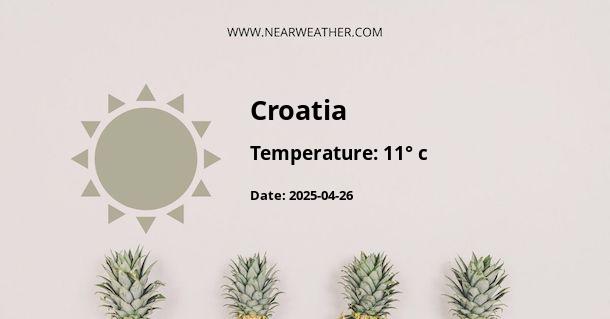Discover the Seasons of Croatia: A Year-Round Weather Guide
The Republic of Croatia, nestled along the Adriatic Sea, is a gem of diverse weather patterns and climates. Due to its geographical location, spanning from the edges of the Pannonian Plains, the Dinaric Alps, to the coastlines of the Mediterranean, Croatia experiences a variety of weather conditions throughout the year. Here we will explore Croatia's climate and weather, providing you with a detailed and seasonal breakdown that could help visitors and locals alike in planning their activities.
Understanding Croatia's Climate Zones
The Pannonian Plains: Dominated by a continental climate, this area experiences hot summers and cold winters.
The Mountainous Regions: Encountering alpine climate, the Dinaric Alps experience cooler temperatures with heavy snowfall during winter.
The Adriatic Coast: Exhibiting a Mediterranean climate, the coastline enjoys mild, wet winters and hot, dry summers.
Croatia's Weather by Season
Winter (December - February)
| Region | Temperature Range | Precipitation |
|---|---|---|
| Continental | -2 to 3°C | Snow and rain |
| Mountainous | -5 to 0°C | Heavy snowfall |
| Coastal | 5 to 10°C | Rain |
During winter, the continental region often experiences sub-zero temperatures, with the possibility of snowfall. The mountainous regions serve as winter sports destinations due to significant snowfall. Coastal areas are milder but can be damp, with the occasional cold snap influenced by the 'bura', a northeasterly wind.
Spring (March - May)
| Region | Temperature Range | Precipitation |
|---|---|---|
| Continental | 8 to 18°C | Moderate rain |
| Mountainous | 4 to 15°C | Moderate rain/snow |
| Coastal | 10 to 20°C | Moderate rain |
Spring marks the transition period with progressively warmer weather. The continental region begins to thaw from winter's grip, while the mountainous area's snow starts melting, increasing water levels in rivers. The coastline sees a noteworthy increase in sunshine hours, making it perfect for outdoor activities.
Summer (June - August)
| Region | Temperature Range | Precipitation |
|---|---|---|
| Continental | 18 to 30°C | Thunderstorms |
| Mountainous | 15 to 25°C | Occasional rainstorms |
| Coastal | 20 to 30°C | Low |
Croatia's summer is usually marked with clear skies and hot temperatures, particularly in the inland areas and along the coast. The coastal region is favored by tourists for its idyllic beach weather. However, summer thunderstorms can be quite common in the continental zone.
Autumn (September - November)
| Region | Temperature Range | Precipitation |
|---|---|---|
| Continental | 10 to 20°C | Increased rain |
| Mountainous | 8 to 16°C | Rain and early snow |
| Coastal | 14 to 24°C | Rain |
The autumn period brings cooler temperatures and an uptick in rainfall. This season is characterized by the beautiful change of foliage within the continental and mountainous regions. Tourists often favor the coast during this time for the less crowded attractions and pleasant weather conditions.
Extreme Weather Events and Microclimates
"Croatia is susceptible to a range of extreme weather events, including severe thunderstorms, flash flooding, and heatwaves, particularly during the summer months. Precautions and timely weather updates are essential for those traveling within the region during these periods." - National Meteorological and Hydrological Service of Croatia
Annual Temperature and Precipitation Patterns
Across the country, Croatia has clear patterns in terms of temperature and precipitation:
- Temperatures: Warmest month is typically July, with coastal areas seeing temperatures above 30°C, while the coldest month is January, especially in the continental region.
- Precipitation: Late autumn and winter are the wettest periods, particularly on the Adriatic coast where rainfall can exceed 1200 mm annually. Conversely, the continental region has drier conditions with annual precipitation levels around 600 mm.
Weather Monitoring and Forecasting in Croatia
The National Meteorological and Hydrological Service of Croatia provides comprehensive weather forecasts, severe weather warnings, and climate data, leveraging advanced meteorological instruments and technologies such as radar, satellite, and automated weather stations.
Climate Change Impact on Croatia
Climate change is a growing concern for Croatia as it has begun altering weather patterns and increasing the frequency of extreme weather events. Research studies indicate a trend toward hotter summers, milder winters, and variation in precipitation that could impact water resources, agriculture, and tourism.
Conclusion
Understanding the nuances of Croatia's climate is invaluable for anyone considering a visit or conducting activities within the country. With its beautiful coastlines, lush inland forests, and snow-capped mountains, Croatia offers a rich tapestry of weather conditions that cater to a wide range of preferences and pursuits throughout the year.
A - Croatia's Latitude is 45.166672 & Longitude is 15.500000.
A - Weather in Croatia is 11° today.
A - Climate Conditions in Croatia shows overcast clouds today.
A - Humidity in Croatia is 95% today.
A - Wind speed in Croatia is 4.72 km/h, flowing at 352° wind direction. today.
